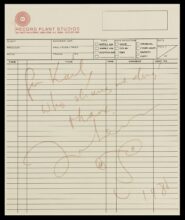Grant Hart, one of the founding members and drummer for Hüsker Dü, died on Thursday (September 14) after battling cancer. He was 56.
Fellow band member Bob Mould wrote:
It was the Fall of 1978. I was attending Macalester College in St. Paul, Minnesota. One block from my dormitory was a tiny store called Cheapo Records. There was a PA system set up near the front door blaring punk rock. I went inside and ended up hanging out with the only person in the shop. His name was Grant Hart.
The next nine years of my life was spent side-by-side with Grant. We made amazing music together. We (almost) always agreed on how to present our collective work to the world. When we fought about the details, it was because we both cared. The band was our life. It was an amazing decade.
We stopped working together in January 1988. We went on to solo careers, fronting our own bands, finding different ways to tell our individual stories. We stayed in contact over the next 29 years — sometimes peaceful, sometimes difficult, sometimes through go-betweens. For better or worse, that’s how it was, and occasionally that’s what it is when two people care deeply about everything they built together.
The tragic news of Grant’s passing was not unexpected to me. My deepest condolences and thoughts to Grant’s family, friends, and fans around the world.
Grant Hart was a gifted visual artist, a wonderful story teller, and a frighteningly talented musician. Everyone touched by his spirit will always remember.
Godspeed, Grant. I miss you. Be with the angels.
Hart was born in St. Paul, MN and, at the age of 10, he inherited his older brother’s drum set after he was killed by a drunk driver.
Throughout high school, Grant played in a series of bands and, while working at a record store, met Mould who was attending local Macalester College. The two became friends and brought in Greg Norton and keyboard player Charlie Pine to start a new band. Pine did not last and the three moved forward under the name Hüsker Dü.
Their first single, “Statuses”, was a self produced affair and released on Reflex Records in 1981. Their touring brought them to the attention of such punk artists as Jello Biafra and Black Flagg’s Greg Ginn who spread the word about the new band.
In January 1982, the released the live album Land Speed Record and, the next year, their studio debut, Everything Falls Apart, both on Reflex. As their popularity grew, Ginn once again got involved by signing them to his SST Records.
In October 1983, they released the EP Metal Circus, which added more melody to their punk rock style and drew a new audience from colleges who made Hart’s “Diane” and underground radio hit. They followed with the concept album Zen Arcade which became their first to hit the national charts, reaching 11 on the U.K. Indie Albums.
Over the next two years, they would release four more studio albums, including two for Warner Brothers, with each reaching a greater audience topped by Warehouse: Songs and Stories (1987 / #117), but tensions in the band between Mould and Hart, which had been a problem for years, grew to the point that, during the tour in support of Warehouse, Hart quit the band.
In 1988, Hart released his solo debut, the EP 2541 and followed with the album Intolerance (1989) and the EP All of My Senses (1990) before forming the band Nova Mob. The band released two LPs and an EP before breaking up.
Hart would go on to release three more solo studio albums including 2013’s The Argument. He and Mould reunited in 2005 for a benefit for Karl Mueller of Soul Asylum. Grant was also the subject of the 2013 documentary Every Everything: The Music, Life & Times of Grant Hart.
Grant made his last appearance in July at an all-star concert in his honor in Minneapolis.


















